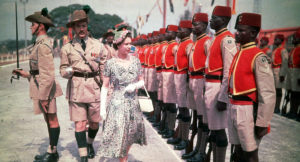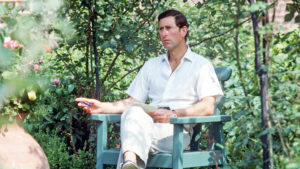If the media coverage of the monarchy seems fawning now, it is nothing compared to that of the Fifties. Even the corgi “had a smile on his face”, gushed the papers, as they sought to describe one Royal appearance. The young Queen Elizabeth II was seen as existing beyond criticism, certainly beyond humour. The BBC vetoed Peter Sellars doing an impression of her on The Goon Show, and it was not until 1964 that a national newspaper ran a cartoon of her. She was treated with such po-faced reverence that the News Chronicle could call her in 1954 “the world’s principal human being”.
John Osborne, the world’s principal Angry Young Man, was incensed by that sort of talk. There was a “trough of Queen worship”, he raged, “the National Swill”. And he described monarchy as “the gold filling in a mouthful of decay”. His attack was only to be expected, of course — there’s no point in having Angry Young Men unless they’re working themselves up about something or other.
But other isolated voices of dissent were beginning to be heard, and some were harder to ignore since they came from within what had recently been dubbed “the Establishment”. There was, for example, Woodrow Wyatt, then a Labour MP though later a disciple of Margaret Thatcher. “Mooning about the Royal Family is one of the main contributory factors to Britain’s plight,” he complained in 1956. “It saps our dynamism. It makes us dwell on the past.”
Or there was John Grigg, who could hardly have been more Establishment: Eton, Grenadier Guards, Oxford, Tory parliamentary candidate, latterly the 2nd Baron Altrincham. So when he said rude things about the Queen in his 1957 article “The Monarchy Today” — published in the magazine he edited, the National and English Review — it proved especially controversial.
He was no republican, Altrincham insisted, he was merely seeking to reinvigorate the monarchy, which was too remote, surrounded “almost without exception by people of the ‘tweedy’ sort”. But at the centre of his criticism was the Queen herself. Five years into her reign and she really needed to buck her ideas up. Her public persona was that of “a priggish schoolgirl, captain of the hockey team, a prefect, and a recent candidate for Confirmation”, while her “style of speaking is frankly a pain in the neck”. What was to become of her “when she has lost the bloom of youth”?
The article didn’t win him many new friends. It was roundly condemned by pretty much everyone, from the Archbishop of Canterbury (who hadn’t read it), down to the leader of the Conservative group on Altrincham Council in Cheshire, who wanted to distance the town from the man who bore its name. Nor did the abuse stop there. “Altrincham, if we ever see you in the street, we’ll do you in,” said one of the many letters he received. “You go too flamin’ far when you criticise our Queen.” It was signed: “Eight (loyal to the Queen) Teddy Boys”.
Nothing came of that threat but he was thumped in the face by the Deputy Chairman of the League of Empire Loyalists (a far-Right group that went on to co-found the National Front). The assailant was 64-years-old and didn’t pack much of a punch, so he got off with just a one-pound fine, together with the sympathy of the magistrate: “96% of the population were disgusted and offended by what was written”.
A couple of months later, journalist Malcolm Muggeridge — still then in his incarnation as iconoclast — joined in with his own article, “Does England Really Need a Queen?”, written for the Saturday Evening Post. His analysis was hardly startling. “The British monarchy does fulfil a purpose,” he wrote. “It provides a symbolic head of state transcending the politicians who go in and out of office.” But as he made his way to his somewhat obvious conclusion, he dropped in some wonderfully scandalous titbits of upper-class gossip. “It is duchesses, not shop assistants, who find the Queen dowdy, frumpish and banal,” he revealed. The whole thing had become “a kind of Royal soap opera”.
Like Altrincham, Muggeridge found himself under severe and sustained criticism. Angered by the distorted, misquoted accounts of his article, he consulted a lawyer on whether he could sue for libel, but was told that, while there undoubtedly was a case, “in view of the circumstances, and the particular matter at issue, I could not count upon a jury or a judge taking an unprejudiced view”.
What these early critics demonstrated was that in a world of sycophancy, there was a good deal of media mileage to be made from thumbing one’s nose at the royals. Played right, there was a career in this.
The man for the job was Willie Hamilton. He was a Labour MP from 1950 to 1987, yet the only national coverage he ever received was in his role as an outspoken republican, “the Hammer of the Windsors” as the press liked to call him. He complained about the cost of the monarchy, describing the royal family as “scroungers”, but there was a deeper complaint that sometimes surfaced: the Queen represented a class that had “deeply hurt the class to which I belong and which I represent in our sovereign Parliament”. For years he was Fleet Street’s go-to guy for a bit of outrage on a royal news story; a happy event such as a wedding wasn’t complete without Hamilton carping about the cost. His autobiography was titled Memoirs of an Anti-Royalist, because this had become his identity; effectively he’d been subsumed into that great royal soap opera, the pub cynic who knew the price of everything and the value of nothing.
Others were drawn in as well. Come the Queen’s Silver Jubilee in 1977, John Grigg, the former Lord Altrincham (he’d renounced his title in the interim), returned to the storyline. This time he praised “her exceptionally steady character” — which was pretty much what he’d condemned her for back in the Fifties. “She looks a Queen,” he now wrote. “She behaves decently because she is decent.”
The Silver Jubilee also saw the soap opera acquire an alternative theme-song: “God Save the Queen” (1977), the second single by punk band the Sex Pistols, sneering about a “fascist regime” and how the Queen (who “ain’t no human being”) “made you a moron”.
It was incendiary stuff, and would have been so at any time, let alone when the Jubilee was reaffirming the nation’s love of monarchy and providing a desperately needed moment of unity in the midst of strife. The promotional artwork, picturing the Queen with a safety-pin through her lip, added visual injury to aural assault. The record was banned by radio and television; it was deplored by MPs; leading retailers declined to stock it, and pub chains refused to have it on their jukeboxes. Meanwhile members of the group were assaulted on the streets by the contemporary equivalents of the “Eight (loyal to the Queen) Teddy Boys”. But the single still shifted 200,000 copies in Jubilee Week alone.
Punk now being associated with anti-monarchy sentiment, others followed, from the underachieving — the Exile’s “Jubilee 77” and the Drones’ “Corgi Crap” (both 1977) — to the over-ambitious: Derek Jarman’s movie Jubilee (1978). But it was the Sex Pistols who became so closely associated with the moment that they got dragged into the soap, not as regular characters, but always there or thereabouts at special times. When the Queen celebrated her Golden Jubilee in 2002, it was marked by a band reunion, accompanied by yet another greatest hits compilation (inevitably titled Jubilee), and a re-release of the offending single, now seemingly part of the ceremonial trappings.
The single was back 10 years later for the Diamond Jubilee, with excited talk of it getting to #1 in Jubilee Week. (It didn’t.) This time, singer John Lydon disowned the whole thing: “I wish for no part in the circus that is being built up around it.” The band also declined an invitation to appear the opening ceremony of the London Olympics that year, though a snippet of “God Save the Queen” was included. It didn’t upstage the Queen’s double-act with James Bond, though.
As the Sex Pistols’ rebellion faded into the warm haze of nostalgia, the problem for others was that there was nowhere much further to go, short of summoning up the spirits of Oliver Cromwell, Madame Guillotine and Yakov Yurovsky. And there was no call for that.
In any case, republicanism had rather lost its forbidden allure. This was apparent even before the martyrdom of Diana in 1997. Five years earlier, Alastair Campbell, then the political editor of the Daily Mirror, denounced the royal family as “the apex of a class system that exposes John Major’s ‘classless society’ for the slogan that it is,” and called for Betty Boothroyd, the Speaker of the House of Commons, to be elevated to the monarchy: “Queen Betty has a rather truer ring than Queen Diana.”
The same year, Sue Townsend’s novel The Queen and I was premised on the election of a republican government, leading the royal family to be rehoused on a rundown council estate. The Queen and Princess Anne are sufficiently practical to adapt to their changed circumstances; Prince Philip not so much. Less seriously, there were books such as Stephen Haseler’s The End of the House of Windsor and A.N. Wilson’s The Fall of the House of Windsor (both 1993).
And then in 1994, the Independent on Sunday became the first mainstream paper to declare itself in favour of the abolition of the monarchy. We needed an elected president, the paper declared, and it asked its readers who that should be. Again, Betty Boothroyd won support, coming in second, ahead of Jarvis Cocker, the singer with Pulp, but behind the people’s choice, Tony Benn. (The highest ranked royal was Princess Anne in eighth place, just behind Richard Branson.)
In such a climate, it was hard to make a mark, though many continued to try. In his first book, God Save the Queen? (2002), Johann Hari, then writing for the New Statesman condemned the Queen’s “cruel neglect of her children”, and said the abolition of the monarchy was necessary “for the mental health of those involved”. The book helped launch Hari on a career that saw him win the Orwell Prize for political journalism (even if that was subsequently withdrawn), but it was incapable of generating the same notoriety as Lord Altrincham or the Sex Pistols had managed.
And maybe it was all grist to the mill. The monarchy has survived the centuries by adapting to new social demands. Its function, as Malcolm Muggeridge pointed out, was as “a useful unifying element in a society full of actual and potential discord”. And if society wanted a pantomime villain or two to express republican views, then that requirement could also be accommodated. “God save history,” sang Johnny Rotten. “God save your mad parade.” And then he too took his place on the periphery of that mad parade, forever associated with the institution he so disparaged. In his respectful tweet to mark the passing of Elizabeth, he included the picture of her that had been used to promote “God Save the Queen”. This time, there was no safety-pin.
Disclaimer
Some of the posts we share are controversial and we do not necessarily agree with them in the whole extend. Sometimes we agree with the content or part of it but we do not agree with the narration or language. Nevertheless we find them somehow interesting, valuable and/or informative or we share them, because we strongly believe in freedom of speech, free press and journalism. We strongly encourage you to have a critical approach to all the content, do your own research and analysis to build your own opinion.
We would be glad to have your feedback.
Source: UnHerd Read the original article here: https://unherd.com/




